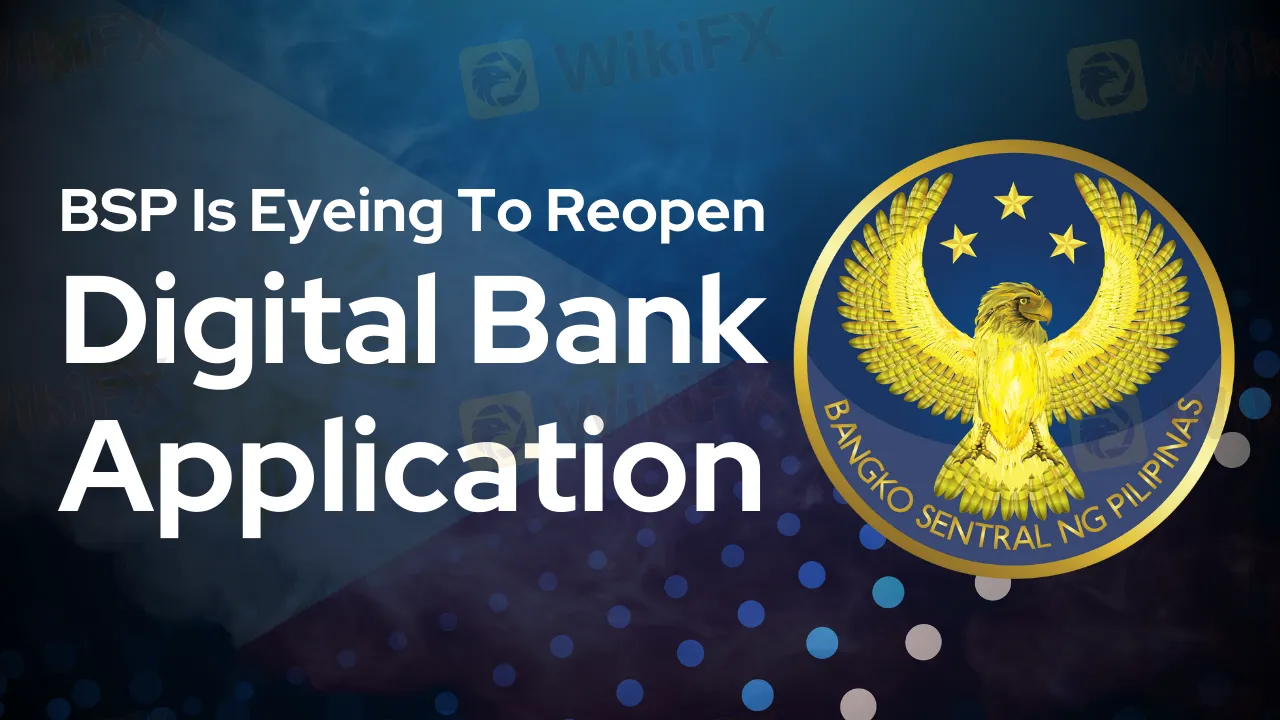简体中文
繁體中文
English
Pусский
日本語
ภาษาไทย
Tiếng Việt
Bahasa Indonesia
Español
हिन्दी
Filippiiniläinen
Français
Deutsch
Português
Türkçe
한국어
العربية
BSP Eyes Reopening License Applications For Digital Banking In The Philippines
Abstract:BSP considers reopening digital bank license applications in the Philippines due to surging interest. Currently, six digital banks operate under BSP's close watch, offering innovative services to millions. As the digital banking sector grows, consumers may soon see new entrants offering advanced banking solutions.

In a recent announcement, Bangko Sentral ng Pilipinas (BSP) Governor Eli Remolona confirmed that the central bank is contemplating reopening the application process for digital bank licenses. This comes in response to the heightened interest and demand in the sector.
BSP's Assessment of Digital Banks Continues
During a press conference on October 11, Governor Remolona revealed the surge of interest from various groups aiming to obtain a digital banking license. “Numerous credible players are applying for these licenses. We're optimistic about resuming the licensing process soon,” stated Remolona.

To closely monitor and understand the nuances of supervising digital banks, BSP imposed a three-year moratorium in 2021, capping the number of licensed digital banks at six. This pause is scheduled to lift post-December 2024. Although previous BSP Governor, Benjamin E. Diokno, hinted at possibly reopening the application window earlier if there's a higher demand for neobanks, it was later suggested by Governor Felipe M. Medalla that potential applicants might have to wait for another two to three years.
BSP Director Ma. Cynthia Sison emphasized that the central bank is rigorously examining the current six licensed digital banks. The decision regarding the moratorium lift will be made once the study concludes.
Snapshot: The Current Six Digital Banks in the Philippines
GOtyme of Robinsons Bank Corp. - A collaboration between the Gokongwei Group and Tyme, it has nearly reached one million customers. The bank's success is attributed to swift customer onboarding and the esteemed Gokongwei brand reputation.
Maya Bank of PayMaya - Launched in April 2022, Maya Bank recently reported achieving a milestone of one million registered customers and a deposit accumulation of ₱10 billion. Furthermore, they've introduced a feature called Maya Mutual Funds allowing users to invest as little as ₱50.
Overseas Filipino Bank (OFBank) - Established to serve overseas Filipino workers and their families, OFBank offers various financial services, making it easier for them to manage finances and remit funds.
Tonik Bank of Singapore - The first licensed digital bank in the Philippines, Tonik aims to tap into the sizable retail deposit and lending market and is also looking at incorporating cryptocurrency features.
UNObank of Singapore - With insurance for deposits up to P500,000 per depositor, UNObank aims to be a holistic platform for multiple financial needs and is planning to offer cryptocurrency services by 2024.
UnionDigital of Union Bank of the Philippines - With a customer base of 1.73 million, UnionDigital is venturing into non-fungible tokens (NFTs) and has forged a partnership with e-sports gaming company Nexplay.
Understanding Digital Banks
In 2020, BSP differentiated digital banks from traditional banking institutions. Digital banks primarily offer services through digital platforms without the need for physical branches. To be licensed, they must maintain a minimum capitalization of ₱1 billion and follow the same fiduciary regulations as other banks.

By August 2022, all six digital banks had acquired the essential certificates of authority, enabling them to operate fully. Notably, changes approved by BSP in September now allow applications for thrift, rural, and cooperative banks with digital models, with existing banks given a 5-year timeframe to comply with the new capital requirements.
As the digital banking landscape evolves in the Philippines, it's evident that there's a strong appetite for these services. With the possible reopening of the license application process, the future seems promising for both potential entrants and consumers seeking innovative banking solutions.

Disclaimer:
The views in this article only represent the author's personal views, and do not constitute investment advice on this platform. This platform does not guarantee the accuracy, completeness and timeliness of the information in the article, and will not be liable for any loss caused by the use of or reliance on the information in the article.
Read more

Forex Options Explained: Your First Step Before Starting Trading
A forex option is a financial contract granting the buyer the right, but not the obligation, to buy (Call option) or sell (Put option) a specific amount of one currency against another currency (a currency pair) at a predetermined exchange rate, on or before a specified future date.

FCA’s Tech Crackdown Suspends 1,600+ Financial Sites
The FCA’s 2024 report details a tech-driven crackdown on financial crime, suspending 1,600+ sites and increasing firm authorisation cancellations in the UK.

FCA’s Tech Crackdown Suspends 1,600+ Financial Sites
The FCA’s 2024 report details a tech-driven crackdown on financial crime, suspending 1,600+ sites and increasing firm authorisation cancellations in the UK.

Truth About Markets.com: 5 Hidden Risks Revealed
There are many brokers that offer too many promotions. Have you ever wondered why they do this? This Could be the story of Markets.com. Before you choose Markets.com, read about the hidden risks they never openly talk about.
WikiFX Broker
Latest News
Alchemy Markets Review 2025: Key Facts and Insights
FXPRIMUS: 5 Things They Don’t Want You to Know
Temasek's portfolio scales new peak even as divestments hit over 2-decade high
5 Serious Warnings About Mirrox! You Can’t Afford to Ignore
Exposing Trade Capital Limited - Siphoning Millions, Restricting Withdrawals, Charging Extra Fees
How Do I Place a Stop-loss Order?
Largest Market Makers
Bitcoin rises to fresh record above $112,000, helped by Nvidia-led tech rally
Stock futures are little changed after S&P 500 posts first winning session in three: Live updates
Nvidia briefly touched $4 trillion market cap for first time
Currency Calculator


